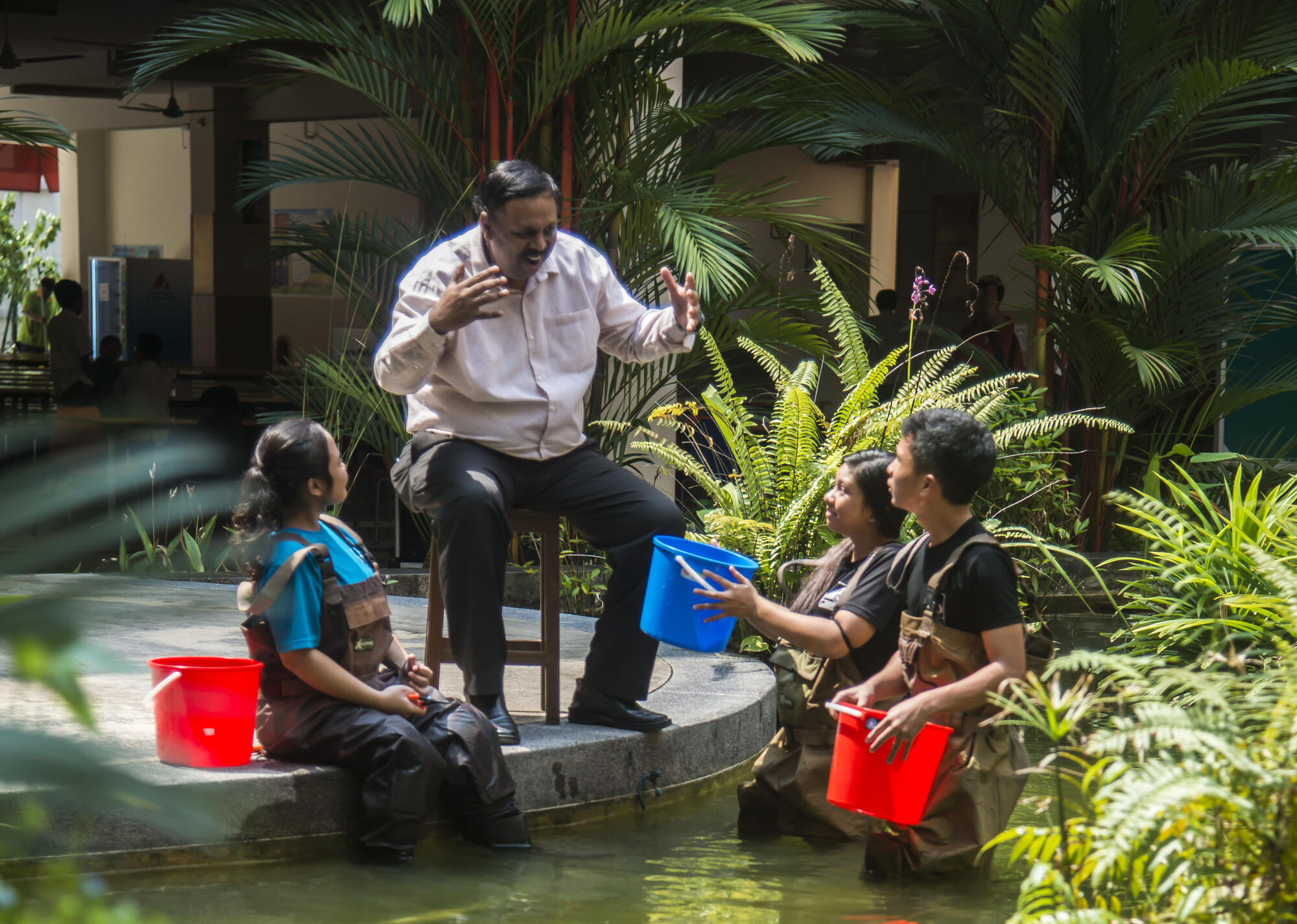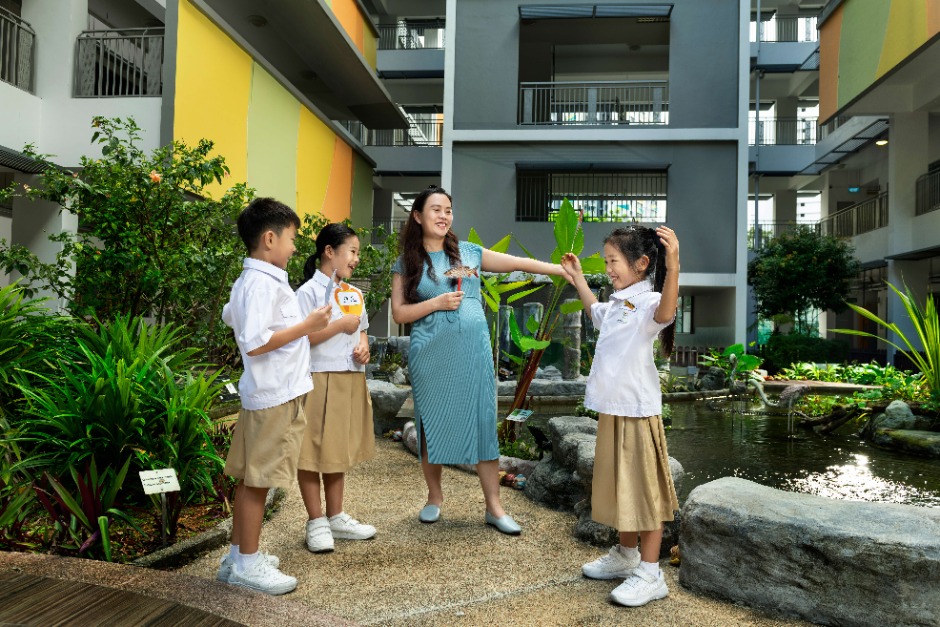Mr Syam Lal S/O Sadanandan, Bukit Batok Secondary School, President’s Award for Teachers 2019 Recipient
What are the chances of teenagers choosing to spend part of their weekend trekking across Singapore with their teacher? If you’re thinking, ‘low’, you have to meet the growing members of Bukit Batok Secondary’s One Earth Club, and their teacher Syam Lal s/o Sadanandan.
The 30 members of the One Earth Club (OEC), which raises awareness of environmental issues, heads out on half-day treks across the country every month. What could be the attraction? Endless conversation in the absence of mobile phones, rich experiential learning about nature and nasi lemak for breakfast.
Says Syam, “I created this club for students who may drop out of Co-Curricular Activities (CCAs). I saw this happen a lot with Normal (Technical) students. So I used this club to ‘catch’ these students, get to know them better and build rapport with them.” Syam also invites those with disciplinary issues to be members of the club.
In his 23 years of teaching, Syam has seen students who lose focus and perform poorly as well as those with disruptive behaviour. To get to the root cause of their issues, he realised that he needed to spend time interacting with his students.
The OEC enables him to do that. It also gives him the opportunity to empower the students and build their self-confidence by providing them leadership positions and responsibilities.
The club has grown in popularity over the years. Current students from CCAs, as well as alumni, seek to participate in the club activities. Together they have explored, in groups of about 40, Pulau Ubin, Coney Island, Sungei Buloh and MacRitchie Reservoir. They have also conducted 3-4 coastal cleanups at Pasir Ris Beach annually.
“My aim is to make these treks a fun learning experience. Along the way, we stop to talk about nature, about plants and symbiotic relationships. Walking with a handful of students each time, I get to speak to them and get better insights into their lives.”
For Syam, establishing the OEC is part of his broader approach to motivate and educate his troubled students, who are mostly struggling with academics, challenging circumstances and despondency. Some contemplate dropping out of school.
“I want students to taste success somewhere (in their lives), to be good at something,” he says. “Once they have this success, they will feel confident and be able to progress (in other areas).”
Turning points
Syam’s own setback in school as an easygoing and sporty teenager helped shape his perspective on teaching.
He used to spend countless afternoons playing football, often too tired to devote much energy and focus on studying. Yet, this former school prefect back in his school days was unconcerned as “passing exams had come naturally” to him.
The O-Level examination proved to be a harsh reality check. He did poorly across his subjects, failed English and repeated Sec 4.
“It was a humbling lesson,” Syam says. “I was a repeat student in a ‘strange’ class because all my friends had moved on. It was a very hard lesson. But, maybe this is the reason I can relate with students who may feel looked-down upon, to counsel and champion them to do better.”
By the time Syam graduated with a degree in Biochemistry, he had already started to seriously consider a teaching career.
“I think it was in my blood,” says Syam, whose great-grandfather had been a teacher and a principal, and whose grandmother had also been a teacher. “I liked the idea of teaching from a very young age.”
As a teacher, one must “build a rapport and develop a basic trust” with students, to quote Syam.
In the course of his career, Syam estimates he has taught and guided about 800 Normal (Technical) students, with nearly all progressing to the Institute of Technical Education (ITE), and some to polytechnics and universities. He talks with great pride about his students. He has also gone over and above to assist some students through tough times.
Syam shares the story of a student with anger management issues. He and his fellow teachers learnt how to avoid triggers, and also came up with a code word to indicate a meltdown, so they could intervene in the right way.
He also encouraged the student to take up rugby, which the student’s father had excelled in. The student was later appointed to a leadership position in the rugby club. He curbed his outbursts as well.
Syam shares another student who wanted to quit the National Cadet Corps because he felt uncomfortable wearing the uniform. Syam persuaded him to remain as his assistant in a non-uniform role. The student fulfilled his responsibilities and completed his CCA.
In another instance, Syam counselled a student who had been playing truant behind her parent’s back. He held a family conference for the mother and child to engage in a heart-to-heart conversation.
“I told her, ‘Look, you’re a very good student. You have leadership qualities, and I want you to come back to school. I have confidence in you,’” he recalls. The intervention worked and the student returned to school. She later became president of the One Earth Club and is now pursuing her studies at ITE.
Building confidence
Over the years and with a multitude of experiences, Syam realises that the needs of students differ significantly.
He used to believe that his students’ needs were like his, hence he taught them the way he was taught in school. But a special education needs (SEN) course he attended made him rethink the need to cater for different kinds of learners.
“(Understanding) SEN opened up my mind.” says Syam.
To enliven his classes, Syam shares fun facts, real-world anecdotes, and game-based learning, such as an escape room concept. He also conducts learning journeys. After a trip to a hydroponic farm, he and his students implemented the technology in the school’s nursery.
“My conviction is that you have to build the confidence of students, so that they believe in a brighter future. They must find success in our programmes to gain this confidence. So long as they have confidence, they will achieve.”




.jpg)

